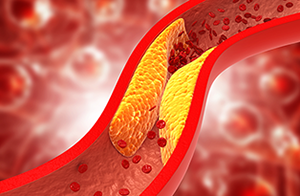What causes high cholesterol and why it matters?

By Daryl Austin
While most people know that high cholesterol isn’t a good thing, fewer people understand what contributes to or causes it.
It can also be helpful to know how to lower cholesterol when high cholesterol levels have been discovered.
“The foremost approach to managing high cholesterol is adopting healthy lifestyle modifications,” says Christopher Pullins, MD, a family medicine physician at Mayo Clinic in Arizona. Such modifications include eating a healthy diet, losing weight if needed and getting sufficient sleep.
What causes high cholesterol?
Some such practices work to lower high cholesterol because the foods one eats contribute significantly to high cholesterol levels in most people. “When you eat foods high in certain types of saturated fatty acids, your liver takes that as a message to synthesize more cholesterol,” explains Jill Weisenberger, MS, RDN, a Virginia-based registered dietician and author of “Prediabetes: A Complete Guide.”
The worst foods for high cholesterol include full-fat dairy products such as whole milk, butter and cheese. Red meat, processed meats, fried foods and baked goods like cookies, cakes and doughnuts can also cause high cholesterol. In general, “avoid foods high in fat, sugar, and salt,” says Caroline Susie, RD, a registered dietician and national spokesperson for the Academy of Nutrition and Dietetics.
She adds that lack of exercise can also contribute to high cholesterol since exercise decreases “bad” cholesterol known as LDL cholesterol by increasing one’s “good” cholesterol known as HDL cholesterol. Exercise can also help one lose weight or maintain a healthy weight which can also increase more of one’s good type of cholesterol.
Beyond diet and exercise, “it’s important to note that some people have a genetic predisposition to elevated cholesterol levels which puts them at increased risk of early cardiovascular problems,” adds Pullins.
Smoking and alcohol can also cause high cholesterol. So can stress because it raises levels of certain hormones that can cause one’s body to make more cholesterol, per the National Heart, Lung, and Blood Institute.
What are the dangers of high cholesterol?
It’s important to understand what causes high cholesterol because there are real dangers associated with having it. “Specific types of cholesterol (LDL cholesterol) can contribute to the development of plaque buildup within the walls of blood vessels,” explains Pullins. Such plaque buildup “can obstruct blood flow and potentially lead to severe outcomes,” he says.
These negative outcomes can include heart disease, diabetes and circulation issues related to a condition known as peripheral arterial disease. Even more severely, high levels of LDL cholesterol can increase one’s risk for heart attack and stroke, per the Centers for Disease Control and Prevention (CDC).
What are the symptoms or warning signs of high cholesterol?
With such dire outcomes on the line, many want to know about the symptoms or warning signs associated with high cholesterol. “Regrettably, elevated cholesterol levels often remain unnoticed for years,” says Pullins. That’s because there are usually no obvious warning signs of high cholesterol and many symptoms related to high cholesterol such as nausea, fatigue, high blood pressure and shortness of breath are often explained away by illness or other conditions.
Because of this, the CDC recommends having one’s cholesterol levels checked at least every five years, a quick testing process that involves a blood draw. “Regular monitoring of cholesterol levels is advisable,” echoes Pullins. He agrees that such tests should occur at least every five years but adds that it may need to be done more often for some people as recommended by one’s primary care doctor. “The frequency of checks varies based on age and risk factors,” he says.
America has a heart disease problem. It’s the leading cause of death for men and women. Per the Centers for Disease Control and Prevention (CDC), heart disease kills, on average, one person every 33 seconds in the United States. The American Heart Association notes that nearly half of all Americans have some type of cardiovascular disease, some of them leading to heart attack, heart failure and stroke.
While there are many causes and risk factors associated with heart disease that include high blood pressure, physical inactivity, and diabetes, one significant contributing factor is high cholesterol.
What is cholesterol?
“High” is the optimal word there as lower cholesterol levels are Ok and some types of cholesterol are even considered to be “good” because they serve important basic functions. Cholesterol is a fatty, waxy substance that is produced in the body and is “used to make hormones and vitamin D,” explains Jill Weisenberger, MS, RDN, a Virginia-based registered dietician and author of “Prediabetes: A Complete Guide.”
Cholesterol is also instrumental in building cells, storing fat, assisting in bile production in the liver and in helping one’s metabolism work more efficiently.
How is cholesterol produced?
Much of the body’s cholesterol is produced in the liver − “about 80%,” says Caroline Susie, RD, a registered dietician and national spokesperson for the Academy of Nutrition and Dietetics. From there, she says it travels through the blood on proteins called lipoproteins and “helps sends signals all over your body.”
Though one’s liver “can make all the cholesterol you need,” says Weisenberger, another significant source of cholesterol comes from the food one eats. Any foods containing animal fat have some cholesterol, but “the highest sources of dietary cholesterol are beef, chicken and other livers,” Weisenberger explains. Full-fat dairy products, fried foods, and baked goods are also high in cholesterol.
How to lower cholesterol
Because one’s diet significantly affects cholesterol levels, eating better is an important first step towards lowering cholesterol. Foods that are known to lower cholesterol include oats, barley, beans, nuts and fatty fish, according to Harvard Medical School.
One general rule to follow in choosing the right foods is to replace “saturated fatty acids with unsaturated fats,” suggests Weisenberger. Think cooking with oil instead of lard. And though the cholesterol in eggs gets a bad rap, the Cleveland Clinic notes that one egg contains only 8% of one’s daily allowance for saturated fat. Still, if you’re worried about the cholesterol in eggs, sticking to egg whites alone will give you the protein and nutritional benefits of eggs without the cholesterol downsides.
Susie recommends consuming “high fiber foods,” and getting plenty of fruits and vegetables. “No plants have cholesterol,” echoes Weisenberger.
One’s lifestyle also affects cholesterol levels. Losing weight or maintaining a healthy moderate weight will decrease the amount of cholesterol the liver produces and also lower one’s chances of having “bad” cholesterol in one’s blood. “Exercise can also increase levels of good cholesterol,” offers Susie.
Weisenberger says that other important strategies that can help one manage healthy cholesterol levels include “getting more sleep and avoiding tobacco.”



